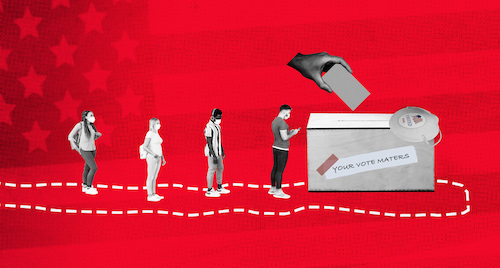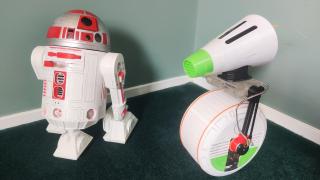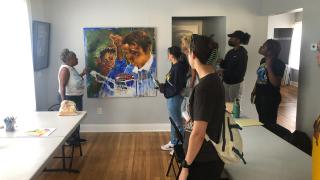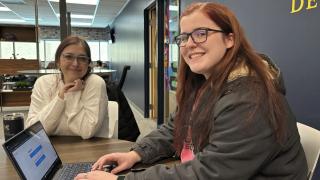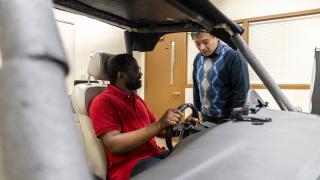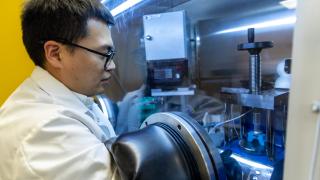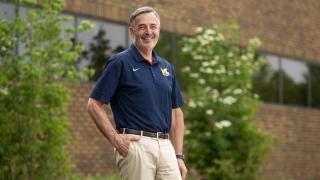
UM-Dearborn sophomore Drew Harper’s intense interest in the 2020 election runs deeper than the fact that it’ll be her first time voting for a U.S. president. In fact, you could argue she’s far more focused on making sure other people have a good voting experience. After learning in one of her political science classes about the shortage of poll workers, she decided to pitch in and help recruit college students to fill the gaps. Now, she’s one of dozens of students working across 12 states as part of the Campus Vote Project’s effort to get young people to perform a crucial service that’s traditionally shouldered by older Americans.
“Personally, I’m very interested in why younger people and the African American community tend to vote less,” Harper says. “One of the reasons is it can actually be pretty difficult to vote. There are often long lines, the process can be confusing if you’ve never done it before, there are sometimes voter suppression efforts, and a lot of that comes down to shortages of poll workers and how well our polling places work. Voting is our right, but if you have to wait two hours in line to exercise that right, is that fair? So I wanted to do anything I could to minimize that.”
Harper’s next-level involvement in the election puts her in a select subset of her demographic. Young people historically vote at lower rates compared to older voters, though very recent history indicates that could be changing. Voter turnout among young people doubled during the 2018 midterms compared to 2014; and with Gen Zers and millennials now making up roughly the same share of the electorate as boomers and Gen Xers, some are predicting this could be the year the youth turnout finally materializes.
Harper is hopeful that will happen, though she’s anecdotally seeing trends that could push youth turnout in either direction. She says a lot of young people who weren’t engaged before have found themselves drawn into politics in recent months — particularly because of the Black Lives Matter movement, and more recently and acutely, the death of Justice Ruth Bader Ginsburg. On the other hand, lots of her peers express variations on a familiar theme: the idea that one vote — their vote — hardly matters.
UM-Dearborn’s civic engagement coordinator Julie Colbath says she hears that sentiment a lot too. “For some people, it’s a distrust of the system: Like in the 2016 election, a majority of people did not vote for Trump, and yet here we are because he won the Electoral College,” Colbath says. “I’ve heard others say it’s like choosing the lesser of two evils, because they feel like the politicians are just about the money and not representing the people. And I think the other thing we have to acknowledge is that there is a lack of knowledge about how to actually vote if you’ve never done it before. Voting should be easy, but the reality is it can be a confusing and overwhelming experience.”
This election, voting is arguably more complicated than ever and Colbath is working on a variety of fronts to help younger voters feel more prepared and relaxed about the process. In these final few weeks, she’s stressing the idea of having a “voter plan” particularly hard. That means knowing a lot more than just who you plan to vote for. It involves thinking through all the little details and choices that are actually involved in voting, like whether to vote in-person or absentee; where your polling place, city clerk’s office or nearest dropbox is; how you’re going to get there; and having a backup plan if you’re Plan A doesn’t work out. Even the small stuff matters — like having enough stamps to mail in your ballot. (Colbath says it takes two, by the way.) The idea is that by doing a mental walkthrough of the entire voting process ahead of time, first-timers won’t feel as overwhelmed and will be more apt to vote.
Harper says she’s remaining optimistic these kinds of efforts — and the gravity of the times — will pay off on election day. “I hope I’m not being too optimistic, because historically, young people haven’t turned out,” she says. “But I think in the past, maybe it was easier for young people to feel like voting doesn’t matter because they couldn't see how anything in their lives really changes. This time, with everything going on, I feel like that’s a much harder case to make.”

